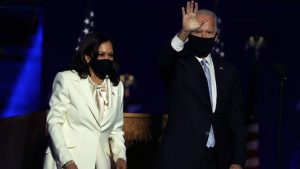

News
[Op-Ed] Hip Hop Democracy and the Future of Our Freedom
by Kyle T. Mays, Ph.D. In the wake of the election of president-elect Joe Biden and the incoming Vice President, Kamala Harris, who will be the first Black and Southeast Asian…
by Kyle T. Mays, Ph.D.
In the wake of the election of president-elect Joe Biden and the incoming Vice President, Kamala Harris, who will be the first Black and Southeast Asian woman, millions of people were happy that President Donald Trump will no longer be in the White House. People partied in the streets. Although we should be ecstatic, we still have work to do.
People can be joyful in this moment of important change, but we should proceed cautiously. Black male Hip Hop artists like Lil Wayne, Ice Cube, and 50 Cent aligned themselves publicly with Trump. It was a huge mistake on their part. It didn’t matter, because Biden won the electoral college, and earned the most votes ever, at more than 75 million. Yet, Trump earned the second-most ever, at nearly 71 million. Some Republicans voted for Biden but did not vote Democratic in state elections.
We can argue all we want about the nuances of who voted for him and why, but to me, it is clear: Donald Trump was an outward white supremacist in office, and voting for him because of “conservative values” won’t cut it. This is not good for the 2024 election. We still have work to do. After all, unless Trump is charged with criminal charges, he could run again and could get just about the same number of votes. The Hip Hop community can play an important role.
Hip Hop Nation has always been political. From its inception, rappers and taggers used their voice and visual expressions to tell stories about the condition of poor, working-class Black and Latinx communities. Before Hip Hop engaged in mainstream politics, they were in the streets placing their tattered ballots on the walls of dilapidated New York City buildings and daring society to push them to the edge. Hip Hop’s elements aren’t just cultural production. Drawing on a historical blueprint laid out by organizers like Fannie Lou Hamer and the Student Nonviolent Coordinating Committee, parts of Hip Hop Nation has been deeply committed to community organizing. They have encouraged young people to vote but also to be involved in their communities every day, not just every four years.
The Hip Hop community, especially at the grassroots level, has a lot of work to do over the next several years to avoid a letdown. We can’t rely on the voices of Hip-Hop billionaires and millionaires who may not represent the interests of those they claim to represent. For almost twenty years the Hip Hop community has sought to engage young people in voting with the Vote or Die campaign, Rock the Vote, and Respect My Vote campaigns. Those have been important in encouraging young people to vote. However, we don’t need to create a new political party to “represent” Black people. A study of the 1972 Black Political Convention held in Gary, Indiana would reveal a lot about how diverse Black politics truly are. Black youth are engaged in politics on the ground, and one of the best ways to help is to donate money and other resources to the causes that they actually want.
We must persist in our struggle for our freedom. There are grassroots organizations at the local level that have continued the work of social change. Many organizations continue the struggle to make Black Lives Matter every day. Assata’s Daughters, based in Chicago, is a Black woman, femme, and gender non-conforming group that continues the work of Black liberation, inspired by the activism of Assata Shakur. Shakur has been in exile in Cuba for decades, remains on the FBI’s Most Wanted list, and is the godmother of the late, Tupac Shakur. Other groups include the Aadizookaan, a Black and Indigenous artistic collective in Detroit. They combine Hip Hop culture and Indigenous storytelling techniques to encourage young people to decolonize their neighborhoods and continue the work of making sure that Black and Indigenous Lives matter in Detroit and beyond. Another organization is 1Hood, led by rapper Jasiri X, who educate young people through creative arts. There are hundreds of organizations that could use more resources to do the work in their local communities.
Hip Hop royalty could, as some are likely already doing, donate money and resources to these types of grassroots organizations. They can de-platform their brands and uplift those groups who really need the assistance. But the question, of course, is who is in their ear?
In some ways, it doesn’t matter what the elites in our communities do. As long as those on the ground continue to struggle, we will get our freedom. Voting is important, but without constant on the ground struggle, political education, and working against the forces that impact us, like police brutality and extreme poverty, the electing of Biden and Harris won’t matter. We still have work to do.
Kyle T. Mays, Ph.D., is an Assistant Professor of African American Studies, American Indian Studies, and History at UCLA. He is the author of Hip Hop Beats, Indigenous Rhymes: Modernity and Hip Hop in Indigenous North America (SUNY Press, 2018) and is finishing up a book titled, An Afro-Indigenous History of the United States (Beacon Press, forthcoming, November 2021)
The post [Op-Ed] Hip Hop Democracy and the Future of Our Freedom appeared first on The Source.
Stay updated! Click the Google News follow button for more news and updates.
Follow on Google NewsNews
Bianca Censori Defies Hotel Dress Code in Scandalous Style with Kanye West
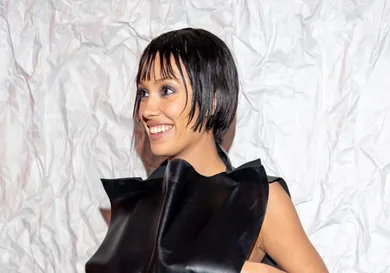
Earlier this week, Bianca Censori and her husband Kanye West were spotted at the iconic Chateau Marmont for lunch. The Australian model, known for her daring fashion choices, turned heads yet again with her provocative outfit. Censori sported a tiny pair of shorts, black heels, and a revealing white bikini top, which undoubtedly caught the attention of both onlookers and the hotel staff.
Despite Chateau Marmont’s strict business casual dress code, Censori’s nearly nude appearance did not elicit any complaints from the staff. This is not the first time Censori has pushed fashion boundaries at the luxury hotel. Earlier this month, she made headlines by arriving in a thong and later in a sheer nude mini dress paired with long stockings, heels, and a tan hat, while Kanye shielded her from photographers.
As of now, Chateau Marmont has not commented on Censori’s repeated dress code violations. What do you think of Bianca Censori’s scandalous fashion statements at the Chateau Marmont? Share your thoughts in the comments and stay tuned to Honk Magazine for more updates.
News
Keke Palmer Defends Tyler Perry Amid Misogyny Backlash, “The Real Enemy is the System!”
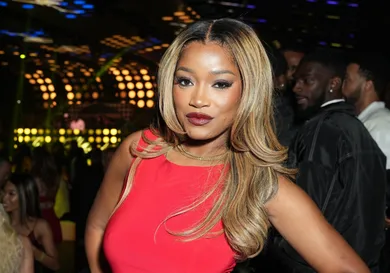
In a recent episode of her podcast Baby, This is Keke Palmer, Keke Palmer hosted Tyler Perry, sparking intense discussions online. Perry’s comments, addressing long-standing criticisms that his films often depict Black women in distress, went viral. Defending his creative choices, Perry stated, “A large portion of my fans are disenfranchised. Who cannot get in the Volvo and go to therapy on the weekend. You’ve got this highbrow negro who is all up in the air with his nose up looking at everything… Don’t discount these people and say their stories don’t matter. Who are you to be able to say which Black story is important, or should be told? Get out of here with that bullsh*t.”
Perry’s remarks led to significant backlash, including accusations of misogyny. In response, Keke Palmer took to social media platform X to defend Perry. She argued that critics are misdirecting their anger. “The enemy isn’t Tyler, it’s the system that makes it hard for multiple black artists to shine at one time,” Palmer asserted. “Oppression turns you against the person that gets the shine opposed to questioning why there can only be so few at a time. Tyler is not the gatekeeper of all black stories; he’s just one creative who broke through the system. Advocating for others to do the same is the fight, not hating Tyler for his work that many do love.”
Palmer also highlighted Perry’s significant contributions to the Black community in a follow-up tweet, noting his employment of numerous Black individuals and urging followers not to “blame his movies for oppression.”
What are your thoughts on Keke Palmer’s defense of Tyler Perry amid the backlash? Share your opinions in the comments, and stay tuned to Honk Magazine for more updates.
-

 Artist Spotlight23 hours ago
Artist Spotlight23 hours ago“Foreign” by OKARO unleashed a symphonic declaration of independence
-

 Music5 hours ago
Music5 hours agoKyra India’s “Ohio”, An Anthem for the Brokenhearted, Rooted in Raw Emotion
-

 Music3 hours ago
Music3 hours agoDUPLEXITY’s ‘Devil In Blue’. A Sonic Sizzle With a Sinister Twist
-
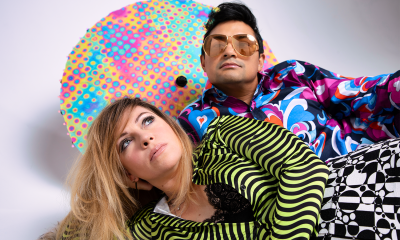
 Artist Spotlight10 hours ago
Artist Spotlight10 hours agoPlasma Chasms sparks a cosmic love affair with “Interstellar Baby”
-

 Music4 hours ago
Music4 hours agoDad’s “Snake Handshake” Slithers Through Industrial Grit with Raw Aggression
-

 Music3 hours ago
Music3 hours agoJody Lynn Sprints to the Heart in Electrifying New Single ‘Running’
-
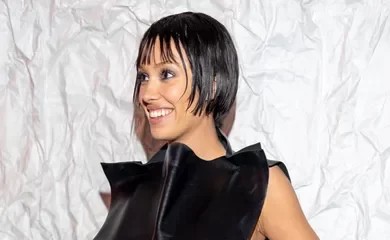
 News2 hours ago
News2 hours agoBianca Censori Defies Hotel Dress Code in Scandalous Style with Kanye West
-

 Music4 hours ago
Music4 hours agoPlayboy Fresh’s New Single, “IDWIFL,” is a High-Flying Anthem of Lavish Living

